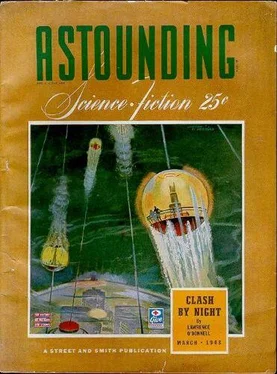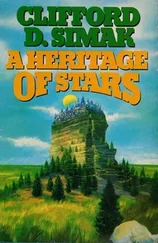Clifford Simak - Shadow Of Life
Здесь есть возможность читать онлайн «Clifford Simak - Shadow Of Life» весь текст электронной книги совершенно бесплатно (целиком полную версию без сокращений). В некоторых случаях можно слушать аудио, скачать через торрент в формате fb2 и присутствует краткое содержание. Год выпуска: 1943, Издательство: Street & Smith Publications, Inc., Жанр: Фантастика и фэнтези, на английском языке. Описание произведения, (предисловие) а так же отзывы посетителей доступны на портале библиотеки ЛибКат.
- Название:Shadow Of Life
- Автор:
- Издательство:Street & Smith Publications, Inc.
- Жанр:
- Год:1943
- ISBN:нет данных
- Рейтинг книги:5 / 5. Голосов: 1
-
Избранное:Добавить в избранное
- Отзывы:
-
Ваша оценка:
- 100
- 1
- 2
- 3
- 4
- 5
Shadow Of Life: краткое содержание, описание и аннотация
Предлагаем к чтению аннотацию, описание, краткое содержание или предисловие (зависит от того, что написал сам автор книги «Shadow Of Life»). Если вы не нашли необходимую информацию о книге — напишите в комментариях, мы постараемся отыскать её.
Shadow Of Life — читать онлайн бесплатно полную книгу (весь текст) целиком
Ниже представлен текст книги, разбитый по страницам. Система сохранения места последней прочитанной страницы, позволяет с удобством читать онлайн бесплатно книгу «Shadow Of Life», без необходимости каждый раз заново искать на чём Вы остановились. Поставьте закладку, и сможете в любой момент перейти на страницу, на которой закончили чтение.
Интервал:
Закладка:
Shadow Of Life
by Clifford D. Simak

Illustrated by Kramer
The thing at the control board tittered in sardonic mockery.
“Your creeds are all in error,” it said. “There is nothing but evil.”
Stephen Lathrop said wearily: “I’ve seen enough.”
“I’ve tried to show you the human race is something that never should have been,” declared the thing. “Maybe an experiment that went sour. By some queer quirk it took the wrong step, followed the wrong path. It became benevolent. There is no room for benevolence in the Universe. It’s not the accepted way of life. I think I’ve proven that.”
“Why did you bother?” Lathrop demanded.
The thing regarded him with fishy eyes. “There was another race. A race that found the answer—”
“We’ll find ours, too,” growled the human being. “By the time they reach us we’ll have the answer. We’ll fight them in our own way.”
“You can’t fight them,” said the thing. “There is no way to fight universal evil. The best you can do is hide from it.”
The Earthman shrugged. “None of them will reach us for a long time. Now that we know about them, we’ll be ready.”
The thing at the controls concentrated on the setting of more studs, then said: “You’ll never be ready. You’re like a candle in the wind, waiting for a gust that will puff you out.”
Through the vision plates Lathrop could see the harsh blackness of space, dotted here and there with unfamiliar stars, dusted with faint mists that were distant galaxies.
Somewhere, far back toward the center of the Universe, millions of light-years from where they cruised, lay the Milky Way, home galaxy of the planets that circled Helios.
Lathrop tried to think back the way they’d come, tried to think back to green Earth and red Mars, but time blurred the road of thought and other memories encroached, cold, fear-etched memories that reached for him like taloned, withered claws.
Memories of alien lands acrawl with loathesomeness and venom. Strange planets that were strange not because they were alien, but because of the abysmal terror in the very souls of them. Memories of shambling things that triumphed over pitiful peoples whose only crime was they could not fight back.
He shook his head, as if to shake the memories away, but they wouldn’t go. He knew they would never go. They would always walk with him, would wake him screaming from his sleep.
They stayed now, those memories, and shrieked at him — rolling, clanging phrases that bit into his brain. Thundering the soul-searing saga of the elder evil that squatted on the outer worlds. Evil on the move, gobbling up the galaxies, marching down the star streams. Unnatural hungers driving sickening hordes across the gulfs of space to raven and to plunder.
Everything the human race held close, he knew, were alien traits to these races he had seen — not alien in the sense they were not recognized, but more terribly alien in that they could not be recognized. There was simply no place in the make-up of those hordes for the decency and love and loyalty that lay inherent in the people of the Earth. The creeds of Earth could never be their creeds — they could no more understand the attitude of the Earthman than the Earthman could understand their sense of rightness in total evil.
“I don’t thank you for what you’ve done,” Stephen Lathrop told the thing.
“I don’t expect your thanks,” the creature replied. “I’ve shown you the Universe, a cross section of it, enough so you can see what is in store for the human race.”
“I didn’t ask to see it,” Lathrop said. “I didn’t want to see it.”
“Of course you didn’t,” said the thing.
“Why did you take me then?”
“The Earth must know,” the thing declared. “The Earth must prepare for the day when this tide of evil moves into its planets.”
“And I’m to tell them about it,” Lathrop said bitterly. “I’m to become one of the Preachers. One of the Preachers of Evil. I’m to stand on soap boxes on the street corners of Earth. I’m to tramp the sands of Mars to bring the message. I’ll be damned if I will do it.”
“It would be a service to your race.”
“A service to tell them they have to run and hide?” asked Lathrop. “You don’t understand the human race. It doesn’t hide. It just gets sore and wants to fight. And even if it did want to hide, where would it go?”
“There is a way,” the thing persisted.
“Another one of your riddles,” Lathrop said. “Trying to drive me mad with the things you hint at. I’ve gotten along with you. I’ve even tried to be friendly with you. But I’ve never reached you, never felt that as two living things we had anything in common. And that isn’t right. Just the bare fact we are alive and alone should give us some sense of fellowship.”
“You talk of things for which I have no word,” the thing declared. “You have so many thoughts that are alien to me.”
“Perhaps you understand hatred then?”
“Hatred,” it said, “is a thing I know about.”
Lathrop watched the creature narrowly as it labored over the control board, adjusting dials, thumbing over trips, punching studs. His hands opened and closed — hands that were withered with approaching age, but hands that still had brutal strength left in them.
Finally the thing swung away from the board, chuckled faintly at him.
“We’re going home,” it said.
“Home to Mars?”
“That’s right.”
Lathrop laughed, a laugh that came between his teeth without curling his lips.
“The trip has been too long,” he said. “You’ll never get me back in time to do any preaching for you. We’re millions of light-years from Mars. I’ll die before we get there.”
The thing flipped slithery tentacles. “We’re close to Mars,” it said. “Millions of light-years the long way around, of course, but close by the way I set the co-ordinates.”
“The fourth dimension?” asked Lathrop, guessing at something he had long suspected.
“I cannot tell you that,” the creature said.
Lathrop nodded at the board. “Automatic, I presume. All we have to do is sit and wait. It’ll take us straight to Mars.”
“Quite correct,” the thing agreed.
“That,” said Stephen Lathrop, “is all I want to know.”
He rose casually, took a slow step forward, then moved swiftly. The thing grabbed frantically for the weapon in its belt, but was too slow. A single blow sent the weapon flying out of a squirming tentacle. The thing squealed pitifully, but there was no pity in Lathrop’s hands. They squeezed the life, surely and methodically, out of the writhing, lashing, squealing body.
The Earthman stood on wide-spread legs and stared down at the sprawling mass.
“That,” he said, “is for the years you took away from me. That is for making me grow old seeing things I wished I’d never seen. For never a moment of companionship when the sight of space alone nearly drove me mad.”
He dusted his hands together, slowly, thoughtfully, as if he tried to scrub something from them. Then he turned on his heel and walked away.
Suddenly he put out one hand to touch the wall. His fingers pressed hard against it. It was really there. A solid, substantial, metal thing.
That settled it, he thought. Stephen Lathrop, archaeologist, really was inside this ship, had really seen the things that lay in outer space. Stephen Lathrop finally was going home to Mars.
Would Charlie still be there? His lips twisted a bit at the memory. Charlie must have hunted for him for a long time — and when he didn’t find him, did he go back to the green Earth he always talked about, or did he return to the city site to carry on the work they had done together? Or might Charlie have died? It would be funny — and hard — to go back to Mars and not have Charlie there.
Читать дальшеИнтервал:
Закладка:
Похожие книги на «Shadow Of Life»
Представляем Вашему вниманию похожие книги на «Shadow Of Life» списком для выбора. Мы отобрали схожую по названию и смыслу литературу в надежде предоставить читателям больше вариантов отыскать новые, интересные, ещё непрочитанные произведения.
Обсуждение, отзывы о книге «Shadow Of Life» и просто собственные мнения читателей. Оставьте ваши комментарии, напишите, что Вы думаете о произведении, его смысле или главных героях. Укажите что конкретно понравилось, а что нет, и почему Вы так считаете.











